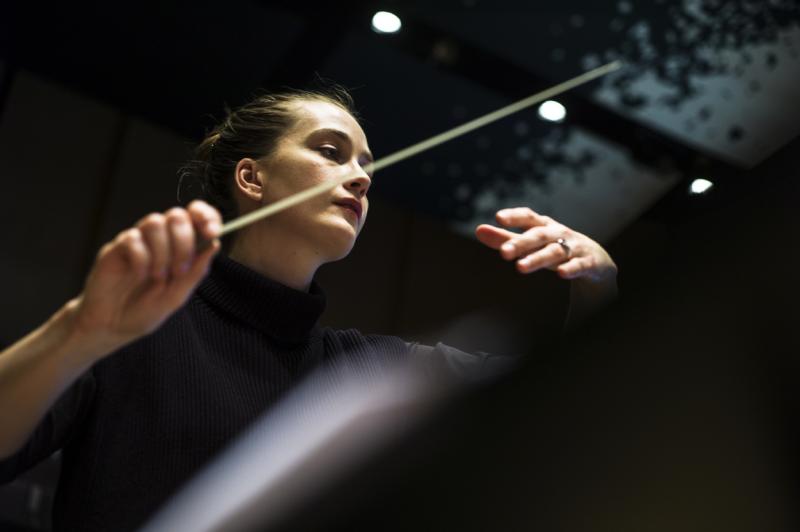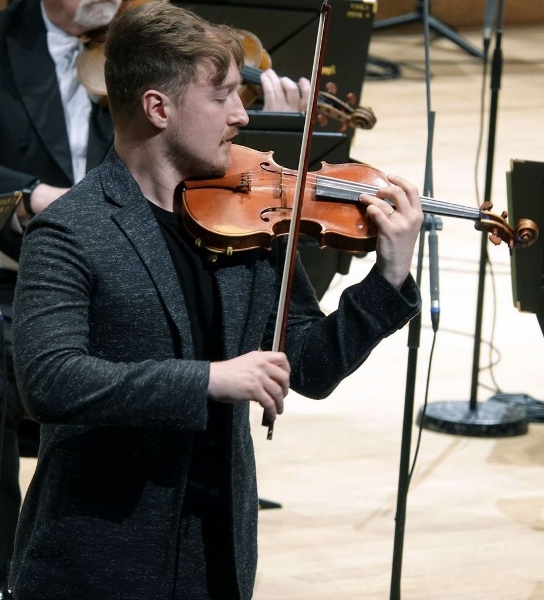Pioro, BBC Philharmonic, Schwarz, Bridgewater Hall, Manchester review - an eco-concerto? | reviews, news & interviews
Pioro, BBC Philharmonic, Schwarz, Bridgewater Hall, Manchester review - an eco-concerto?
Pioro, BBC Philharmonic, Schwarz, Bridgewater Hall, Manchester review - an eco-concerto?
World premiere for violin and orchestra evokes the glories of gardens

Who will write the world’s first eco-concerto? Tom Coult, with his major debut piece for the BBC Philharmonic since becoming its Composer in Association, a violin concerto titled Pleasure Garden, has made his bid.
Perhaps Vivaldi got there before him with The Four Seasons, but it must have seemed a great idea for the orchestra (in tandem with the University of Salford) to commission something to do with climate and the natural world for a concert timed to coincide with COP26.
There’s more than just timing to it. Salford – or more precisely Worsley, a place some way from the city centre but now within its boundary – has recently become home to the Royal Horticultural Society’s newest show garden, RHS Bridgewater. And Coult was inspired by the idea of “constructed natural spaces in and around cities” to write his four-movement work for the orchestra. Daniel Pioro (pictured below by Jenny Whitham) was the soloist in its world premiere, conducted by Elena Schwarz, at the Bridgewater Hall in Manchester. “Bridgewater” is thus the name to conjure with: the third Duke of Bridgewater mined coal and iron in Worsley and built a canal to get his black gold to where it was needed, making a major contribution to the early industrial revolution. His inheritor, Francis Egerton, first Earl of Ellesmere, ruled one of the grandest private estates in northern England, with an enormous kitchen garden, an artificial lake and much more besides… now the RHS garden.
 Tom Coult disowns the idea that his movements tell stories, but three of their titles refer to historical events referenced by him in his programme note, and it’s tempting to hear the sound of a rainstorm in the first – a complex essay in interplay between soloist and orchestra – while the third graphically simulates a furious chorus of birdsong, with the orchestra’s woodwind in full cry. Queen Victoria’s 1851 visit to Worsley, when the enterprising Earl attempted to change the rust colour of his canal water to blue with dye, is commemorated in the second movement, which drums up some suitable pomp and ceremony. The final one, “The Art of Setting Stones”, begins in pentatonically orientalist and almost pointilliste manner (perhaps to capture the more delicate aspects of the Japanese garden-making skill its title refers to), and then transforms its material into music much weightier and more solid... bigger stones, perhaps?
Tom Coult disowns the idea that his movements tell stories, but three of their titles refer to historical events referenced by him in his programme note, and it’s tempting to hear the sound of a rainstorm in the first – a complex essay in interplay between soloist and orchestra – while the third graphically simulates a furious chorus of birdsong, with the orchestra’s woodwind in full cry. Queen Victoria’s 1851 visit to Worsley, when the enterprising Earl attempted to change the rust colour of his canal water to blue with dye, is commemorated in the second movement, which drums up some suitable pomp and ceremony. The final one, “The Art of Setting Stones”, begins in pentatonically orientalist and almost pointilliste manner (perhaps to capture the more delicate aspects of the Japanese garden-making skill its title refers to), and then transforms its material into music much weightier and more solid... bigger stones, perhaps?
Pioro played the demanding solo of the concerto with as much bravura as could be wished and made his instrument produce a remarkably big sound at times – and though the first movement’s orchestral writing threatened to overwhelm him, as heard in the hall, it will probably sound better balanced by the BBC engineers for the broadcast on November 10.
This very tricky score was well piloted by Elena Schwarz, herself making her debut with the Philharmonic. And she showed her gifts go far beyond just being able to hold things together in unfamiliar territory, evident in how she handled the programme’s other constituents. Beginning with a superb stabbing anacrusis at the outset of Kurt Weill’s Second Symphony, that performance never looked back. It’s an attractive piece, imbued with the spirit of the 1930s Paris where it was written, and though it didn’t get rave reviews on its first airing (what do critics know, anyway?), it’s full of the sardonic harmonies, engaging rhythms and song-like melodies of the Weill we know in other contexts.
Under Schwarz’s baton its first movement generated a powerful rise in tension in its later stages, and the solo trombone melody of the Largo (which transforms from a lament into a kind of funeral march) was a delight. The finale starts off fast and then gets faster, but the Philharmonic was up for it and I think enjoyed the baton precision and clear thinking of the woman directing them.
Her other great gift was to recreate the magical world of Ravel’s ballet score Mother Goose. The shorter, five-movement suite (the first form of the piece) is a concert hall favourite, but it’s well worth engaging with his 30-minute expansion of it, too. Subtlety of sound, to conjure the imaginative childhood world Ravel evokes, and a Romantic sweep of feeling every now and then, are what it’s all about, and the Philharmonic musicians, with strings led by Yuri Torchinsky and some glorious wind solos, were happy to deliver and equal to Schwarz’s every nuance.
rating
Share this article
The future of Arts Journalism
You can stop theartsdesk.com closing!
We urgently need financing to survive. Our fundraising drive has thus far raised £49,000 but we need to reach £100,000 or we will be forced to close. Please contribute here: https://gofund.me/c3f6033d
And if you can forward this information to anyone who might assist, we’d be grateful.

Subscribe to theartsdesk.com
Thank you for continuing to read our work on theartsdesk.com. For unlimited access to every article in its entirety, including our archive of more than 15,000 pieces, we're asking for £5 per month or £40 per year. We feel it's a very good deal, and hope you do too.
To take a subscription now simply click here.
And if you're looking for that extra gift for a friend or family member, why not treat them to a theartsdesk.com gift subscription?
more Classical music
 theartsdesk at the Three Choirs Festival - Passion in the Cathedral
Cantatas new and old, slate quarries to Calvary
theartsdesk at the Three Choirs Festival - Passion in the Cathedral
Cantatas new and old, slate quarries to Calvary
 BBC Proms: Estonian Philharmonic Chamber Choir, Kaljuste review - Arvo Pärt 90th birthday tribute
Stillness and contemplation characterise this well sung late-nighter
BBC Proms: Estonian Philharmonic Chamber Choir, Kaljuste review - Arvo Pärt 90th birthday tribute
Stillness and contemplation characterise this well sung late-nighter
 BBC Proms: Kholodenko, BBCNOW, Otaka review - exhilarating Lutosławski, underwhelming Rachmaninov
Polish composers to the fore in veteran conductor’s farewell
BBC Proms: Kholodenko, BBCNOW, Otaka review - exhilarating Lutosławski, underwhelming Rachmaninov
Polish composers to the fore in veteran conductor’s farewell
 theartsdesk at the Pärnu Music Festival 2025 - Arvo Pärt at 90 flanked by lightness and warmth
Paavo Järvi’s Estonian Festival Orchestra still casts its familiar spell
theartsdesk at the Pärnu Music Festival 2025 - Arvo Pärt at 90 flanked by lightness and warmth
Paavo Järvi’s Estonian Festival Orchestra still casts its familiar spell
 BBC Proms: Batsashvili, BBC Scottish Symphony Orchestra, Ryan Wigglesworth review - grief and glory
Subdued Mozart yields to blazing Bruckner
BBC Proms: Batsashvili, BBC Scottish Symphony Orchestra, Ryan Wigglesworth review - grief and glory
Subdued Mozart yields to blazing Bruckner
 Classical CDs: Hens, Hamburg and handmaids
An unsung French conductor boxed up, plus Argentinian string quartets and baroque keyboard music
Classical CDs: Hens, Hamburg and handmaids
An unsung French conductor boxed up, plus Argentinian string quartets and baroque keyboard music
 BBC Proms: McCarthy, Bournemouth SO, Wigglesworth review - spring-heeled variety
A Ravel concerto and a Walton symphony with depth but huge entertainment value
BBC Proms: McCarthy, Bournemouth SO, Wigglesworth review - spring-heeled variety
A Ravel concerto and a Walton symphony with depth but huge entertainment value
 BBC Proms: First Night, Batiashvili, BBCSO, Oramo review - glorious Vaughan Williams
Spirited festival opener is crowned with little-heard choral epic
BBC Proms: First Night, Batiashvili, BBCSO, Oramo review - glorious Vaughan Williams
Spirited festival opener is crowned with little-heard choral epic
 Interview: Quinteto Astor Piazzolla on playing in London and why Mick Jagger's a fan
Music Director Julián Vat and pianist Matias Feigin compare notes on Piazzolla
Interview: Quinteto Astor Piazzolla on playing in London and why Mick Jagger's a fan
Music Director Julián Vat and pianist Matias Feigin compare notes on Piazzolla
 Classical CDs: Bells, birdsong and braggadocio
British contemporary music, percussive piano concertos and a talented baritone sings Mozart
Classical CDs: Bells, birdsong and braggadocio
British contemporary music, percussive piano concertos and a talented baritone sings Mozart
 Siglo de Oro, Wigmore Hall review - electronic Lamentations and Trojan tragedy
Committed and intense performance of a newly-commissioned oratorio
Siglo de Oro, Wigmore Hall review - electronic Lamentations and Trojan tragedy
Committed and intense performance of a newly-commissioned oratorio

Add comment